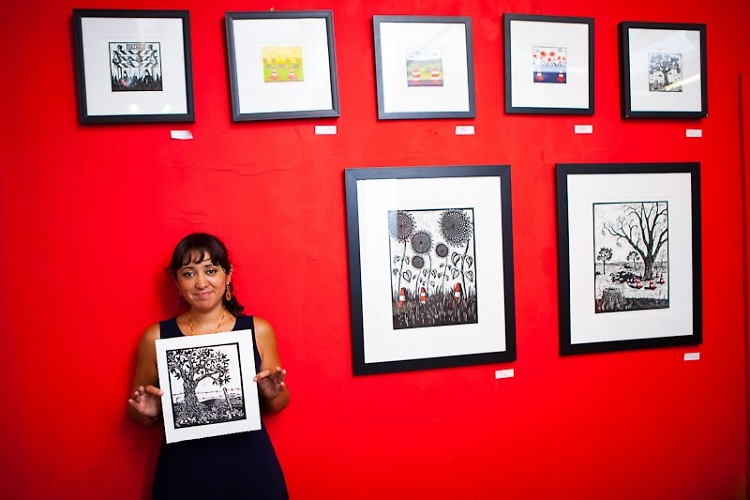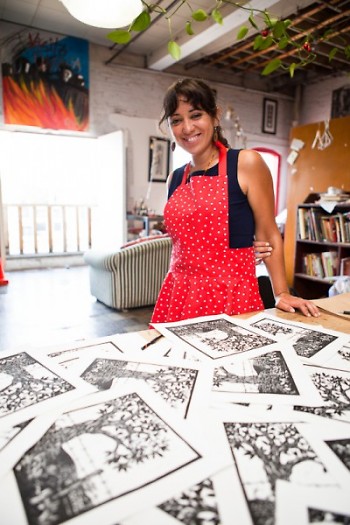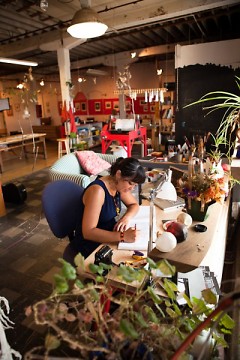“I am definitely very excited and very grateful. I know this is one opportunity in life that is also probably going to change a lot in my life,” says local printmaker Alynn Guerra.
At the time of publish, Guerra is still 1/3 away from the $2000 in funding that she needs for the trip.
Though she is thrilled to see the local plant life and the historical sites in Israel and Palestine, it’s meeting local artists and hearing of their struggles that capture more of Guerra’s attention. She explains that during the Hope Equals Artist Residency Trip she will be attending workshops led by artists, which will include a broad spectrum of art such as poetry, music, photography and film. If there is enough time during the workshops, the Hope Equals travelers will even be given a chance to talk about their own work, though the printmaker says she’s more concerned with listening to the stories of locals.
“We don’t give ourselves enough time to sit down and contemplate everything that’s going on around us. Sometimes we only worry about what’s happening to us instead of actually getting out.”
Alynn Guerra became interested in the Israel and Palestine conflict due to a march she was involved with in Washington D.C after the first invasion of Afghanistan. While she was there, she witnessed a "free Palestine" march and became interested in the issues. Guerra sought out more information and created artwork from what she was learning.
“It was a relief to just let it out,” she explains. “It really weighs down your heart. I’m not very communicative sometimes; I don’t talk about my feelings. But I am able to do it through art. It’s a nice way to let it out, without bothering anyone.”
The printmaker says the best thing that can happen is the chance to explain what she is trying to say with a piece of art when people ask, because that way they are opening up to listening and learning.
“With a painting or something that grabs your attention for a second, just one second and then makes you stop and wonder what’s going on, I think that’s the power of art, a song, a poem. So that’s my hope and what we can accomplish: to get people who have no idea a little interested.”
Guerra says her greatest fear isn’t of suicide bombers or missile attacks, but rather “seeing the conflict and oppression the people are living through face-to-face and not being able to do anything.” She says it’s how the experience is going to affect her when she gets home that worries her, though she is still very aware of the dangers involved with traveling.
Before entering the program, Guerra and the other members of the Artist Residency Trip had to sign a waiver that stated a list of life threatening events that could happen during their excursion. Though the events could possibly affect her physical state when returning home, the printmaker put the risks into perspective by comparing it to the number of casualties in car accidents in the United States.
“The excitement more than the fear is going to keep me awake at night,” she says.
The artist was also warned about being judged and profiled based on the darkness of her skin while over in the Middle East, even by authorities. She says that she understands she might be harassed or detained for several hours, but it’s something she has experienced in the past after traveling out of the United States.
“Every time I enter the country they question me for hours, they make me wait, take all of my fingerprints, pictures of my eyes and the only thing you can do is remain calm. You know that that’s how it is,” Guerra says. “I have nothing to hide. I have nothing to worry about. And that’s the thing, if you allow that stuff to put you down or really affect you, you might not ever want to travel again. But the benefit way outweighs anything you have to go through.”
The Rapidian, a program of the 501(c)3 nonprofit Community Media Center, relies on the community’s support to help cover the cost of training reporters and publishing content.
We need your help.
If each of our readers and content creators who values this community platform help support its creation and maintenance, The Rapidian can continue to educate and facilitate a conversation around issues for years to come.
Please support The Rapidian and make a contribution today.



